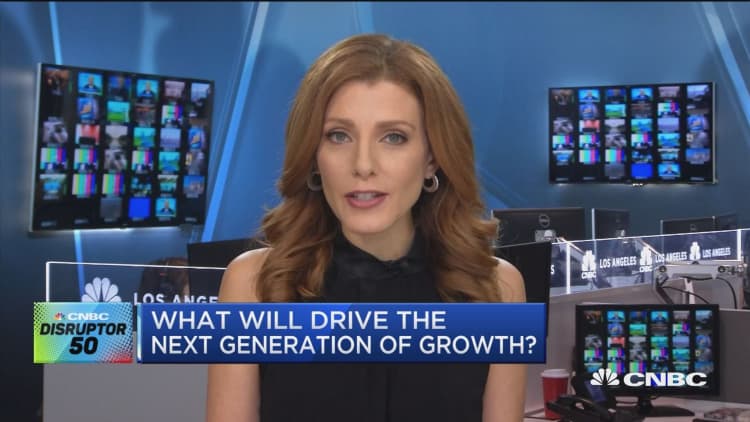Artificial intelligence has been making its way into white-collar professions like accounting, trading and law. Now it's moving into more creative fields, such as writing. AI is being used to pen poems and novels, but the form of writing where AI may have the biggest implications for the majority of Americans is job postings.
Jensen Harris — a tech executive who worked at Microsoft for 16 years and led a redesign of the Microsoft Office user interface and Windows 8 — started Textio with his wife, Kieran Snyder, a linguist, after realizing that there hadn't been any great advances in writing four decades after the typewriter era.
"No one actually built software to do what potentially the most valuable and important thing that software could do, which is actually tell you which words to use to get the result you wanted," said Harris, who is the Textio CTO while Snyder is CEO.
The Seattle-based company has introduced an AI-driven solution that can help HR staffers write better job postings. It recently released Textio Flow, which suggests not only the most effective words but also phrases or whole paragraphs.
Harris' former employer, Microsoft — which owns professional platform LinkedIn — is coming out with a new version of Word, which will help write with what some reports are describing as "political correctness." The technology, called "Ideas in Words," will flag language in documents it thinks may be insensitive, such as "mailman" vs. "mailperson," and make suggested edits. LinkedIn already offers reply suggestions as well as spellcheck.
How Textio works
Textio, which ranked No. 16 on the 2019 CNBC Disruptor 50 list, is one of a growing number of start-ups that are using artificial intelligence to augment or automate writing.
To start, employers choose an industry and city from a dropdown menu. This provides context for the kind of language that's most appealing to that demographic. Say you're a Seattle-based creative agency looking to hire a senior designer. Instead of a straightforward sentence like "Our marketing team needs a creative designer," Textio might suggest "Our company is seeking a detail-minded, creative thinker to join our marketing organization as a senior designer. We are looking for someone who can effectively present design ideas."
Then, in a sentence like "Are you an innovator with imagination and originality?" Textio may suggest swapping out "originality" with the word "ingenuity."
If you don't like the suggestions, you can get many more in an instant.
Harris says Textio's platform doesn't aim to remove humans from the process, emphasizing that it is augmented and not automated writing. The suggestions Textio makes are based on data. Textio has a database with more than half a billion documents that are tied to outcomes. Companies that write job postings in Textio then track response rates in talent management platforms such as Taleo.
Textio's platform knows what someone wrote and what happened as a result and whether the writing created the desired result.
You use language to get the results you want. Whether in a job post or email to get interested in your company or buying your product, the difference between succeeding or failing are the words you use.Jensen HarrisTextio co-founder and CTO
One Textio client is real estate company Zillow Group, which has used the platform to make job descriptions more inclusive to invite a wider pool of candidates. In the two years since the company started using Textio, it's seen 11% more women in its interview pools.
"Textio has opened our eyes to how much inclusive language can impact hiring performance," said Annie Rihn, vice president of recruiting at Zillow.
More from the 2019 CNBC Disruptor 50:
There will be 3.5 million new jobs in this tech sector by 2021
The strategy behind SoftBank's $100 billion start-up funding frenzy
Watch: The A.I.-powered lender challenging the small business banking system
Harris noted that when the platform first launched, job posts that mentioned big data brought in a lot of applicants. But over six months, response rates plummeted. In another example, Harris observed that the word "awesome" is tossed around in a lot of job posts in California and received well, but in New York "people hate it."
"Textio doesn't attempt to know the why. We just know it's true. Hundreds of thousands of key phrases are becoming better or worse," he said.
In addition to job postings and email, Textio also works with marketers. Harris said that about a quarter of Textio's customers are using the platform in marketing. Results from marketing materials, whether it's response rate or something else, can be tracked in CRM platforms such as Salesforce or HubSpot.
"You use language to get the results you want. Whether in a job post or email to get interested in your company or buying your product, the difference between succeeding or failing are the words you use," Harris said.
Early days for A.I.-assisted writing
An increasing number of companies are using AI and machine learning to ease the task of writing, including in the journalism industry.
Last year Reuters announced it was building a "cybernetic newsroom" that would use machine capability and human judgment to help journalists identify trends, anomalies, key facts and suggest new stories reporters should write. Bloomberg creates thousands of articles each year using a program that takes information from financial reports and turns them into news stories, as does the Associated Press for not just business but sports through its Automated Insights partnership.
The common thread among these related but different technologies, said Boris Evelson of Forrester Research, is that much of the technology now is based on rules rather than true artificial intelligence.
"AI and machine learning is the future, and at some point their capability will outpace humans," he said, but for now "there's very little AI or machine learning there. It's not like you can just give it a bunch of documents and it trains itself and learns."

The famous Turing test developed by computer science legend Alan Turing claims true AI is reached once a human no longer knows whether it is communicating with a machine or person. In a recent study, researchers from Cornell and Stanford universities found that profiles that were suspected of being AI-generated were trusted less.
The research involved hundreds of people on Amazon Mechanical Turk who reviewed real profiles of Airbnb hosts, none of which were AI generated. Some of the participants were told that some or all of the profiles were AI generated, while others were told that none of them were. Interestingly, participants trusted all the profiles equally when they were told that all of them were AI generated.
"Our language has a lot of signals that are implicit. The worry is that once AI can create that for you without you having this underlying quality, a lot of signals will lose their value," said Maurice Jakesch, a doctoral student at Cornell and the lead author of the study.
For instance, decades ago it would be a big deal if someone had perfect spelling and could write five pages without a single mistake. But today everyone uses spellcheck, so if there's a mistake in a job application, it's a sign of laziness. On the other hand, if there are no spelling mistakes, it's not particularly meaningful either. In the same way, AI-assisted writing can make you sound assertive or nice or active, but can be meaningless if it's done by AI and doesn't reflect who you actually are.
The rise of AI-assisted or AI-generated writing could eventually change the way people talk to one another, Jakesch said, noting that it's already happening with smart replies in text messages, social media and email, which tend to err on the positive side.
Harris and Snyder say they believe an augmented writing platform such as Textio can help companies with both language and culture and will become commonplace within a decade.
"The feeling of being able to write in this new way, flowing from your fingertips, is so powerful that once you have it, you can't look back," Harris said.






